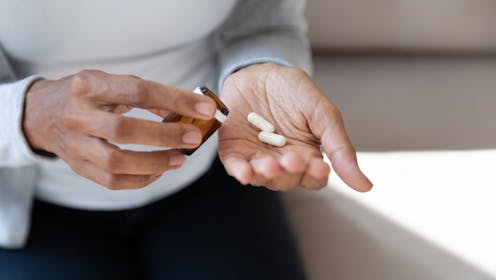
Mental health is key to health and wellbeing. Yet two in five Australians aged 16 to 85 (44%) experience a mental illness during their lifetime, commonly anxiety or depression. And more than 32 million antidepressant prescriptions are dispensed on the Pharmaceutical Benefits Scheme each year for these diagnoses.
Use of antidepressants has increased since the beginning of the COVID pandemic at a greater rate than past decades. As we return to some semblance of normality, people may well be thinking about going off their mental health medicines, particularly antidepressants.
But what are the risks of stepping down or stopping these medicines? Here’s what to consider.
Is there ever a good time to stop antidepressants?
It can take several weeks after starting an antidepressant before symptoms begin to improve. During this time, the person may feel worse before they feel better, as side effects often occur before symptoms improve. Troublesome symptoms (nausea, diarrhoea or insomnia) will usually improve once the body adjusts to the new medicine. So, it is important to give the antidepressant a “fair go” and not stop too early in this process.
For people who have been diagnosed with their first episode of anxiety or depression and are responding to their antidepressant, guidelines recommend a six- to 12-month duration of use, followed by medical review to assess if taking medication is still indicated.
Of course, there are reasons you might be thinking about discontinuing your antidepressant. They could include:
no longer experiencing symptoms of depression or anxiety
finding other ways of coping
medicine seeming ineffective
long-term use and wanting a break
a life event such as pregnancy, divorce or job change
media influences, such as reports about treatments or portrayals of people taking similar medications
side effects, stigma or pressure from family and friends.
Go slowly
In animal studies, restricted plasticity in specific brain parts (that is, the brain’s ability to modify connections or rewire itself) can cause features of depression or anxiety. How antidepressants work is not completely understood. However, recent evidence suggests they protect against or reverse some of these maladaptive neuroplastic changes.
Beneficial effects take time, and stopping antidepressants quickly can unwind the medicine’s neurophysiological adaptations. This can create a “shock to the system” and potentially lead to unwanted side effects such as withdrawal symptoms.
Slower reduction allows the brain time to gradually readjust.
Read more: The TGA has approved certain psychedelic treatments: the response from experts is mixed
What can go wrong when you abruptly stop antidepressants?
Stopping antidepressants abruptly, especially after a long period of use, will make most people – although not everyone – unwell. It’s impossible to tell in advance who will be affected, so slow dose reduction is advisable.
Stopping antidepressants (or tapering down the dose) too rapidly can cause antidepressant discontinuation syndrome in around 20% of people.
Withdrawal symptoms are variable but can include flu-like symptoms (lethargy, fatigue, headache, achiness, sweating), insomnia, nausea (sometimes vomiting), dizziness, sensory disturbances (such as burning or tingling) and hyperarousal (anxiety, irritability, agitation, aggression, mania, jerkiness).
Symptoms typically occur within ten days and usually resolve in two to three weeks. But occasionally, a protracted withdrawal syndrome lasting many months can occur.
People who’ve had irregular doses, switched antidepressants, overlooked side-effects or previous withdrawal symptoms are more likely to experience protracted symptoms and take longer to recover.
Is this withdrawal or a relapse?
In mental illness, the cause of symptoms can be difficult to differentiate. Antidepressant side-effects can mimic withdrawal symptoms or disease relapse, causing confusion for both patients and prescribers.
Withdrawal symptoms tend to surge irregularly like waves. This makes them different to a relapse of the original condition, which has a more consistent pattern and takes longer to develop.
Antidepressant discontinuation is an important decision. Consider whether you are in the right mindset to make this change. Work with a trusted mental health professional to tailor a strategy for your individual circumstances to minimise withdrawal or relapse risk.

Read more: Can taking vitamins and supplements help you recover from COVID?
4 things to think about
Once you’ve considered your reasons for wanting to stop taking an antidepressant and whether you’ve given it a fair shot to work, think about whether you feel well physically and emotionally and have supportive people in your life.
If you still want to embark on a process of stepping down or ceasing medication:
1. approach your prescriber honestly with your reasons for discontinuation and work towards a shared decision to reduce the dose
2. plan dose reduction at a rate suitable for your personal health and duration of antidepressant use (months versus years). Longer use requires a longer taper. Dose reduction can be by as little as 10% or as much as 25% every one to two weeks, followed by another two to four weeks when you can observe how you feel and manage the reduced dose. If symptoms are tolerable, continue tapering as before. But be prepared to move back to the previous or a 10% dose increase if symptoms emerge
3. monitor any symptoms and health by using a daily diary that records the drug dosage throughout the taper
4. maximise the chances of success with self-care: a healthy diet, regular exercise and sleep.
Every medicine we take should have a reassessment date. People taking antidepressants should have their medication reviewed no later than 12 months after they started.
This gives an opportunity for the patient to discuss the risks versus benefits of remaining on their medicine or developing a shared strategy for safe discontinuation.
Treasure McGuire does not work for, consult, own shares in or receive funding from any company or organisation that would benefit from this article, and has disclosed no relevant affiliations beyond their academic appointment.
This article was originally published on The Conversation. Read the original article.







